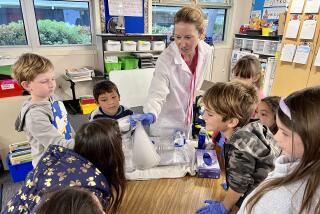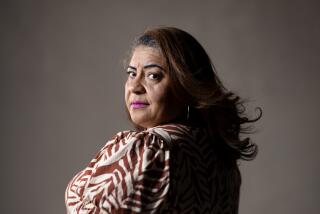Math Teacher’s Innovations Add Up to Presidential Honor
- Share via
Day 10 of the new school year was an important day for the first-grade students in Christina Myren’s classroom at Acacia Elementary School in Thousand Oaks.
Myren, moving constantly among her 31 young charges, was teaching the mathematical concept of zero as a place-holder--often a difficult concept for 6-year-olds to grasp.
“Who can show me zero the hero?” Myren asked, handing out boxes of raisins to the students, who quickly figured out that eating the raisins emptied the boxes, leaving them with nothing.
Students heralded the 10th day of school by marking it in red letters on a calendar, singing songs about the number and visiting a class of fifth-graders to discuss what it’s like to be 10 years old.
With exercises, songs and mathematical games--sometimes read aloud from books that incorporated math into literature--Myren conveyed how a zero placed after a one makes a bigger number than either number alone.
This month, in honor of 22 years of innovation in the classroom, Myren received a Presidential Award for Excellence in teaching math at the elementary level.
As one of 215 math and science teachers to be honored nationwide, Myren will receive a $7,500 National Science Foundation grant for the school and an expense-paid, weeklong trip to Washington next month.
Myren is the first elementary math teacher in California to receive the honor.
A small woman who keeps a guitar and piano in her classroom so she can use music throughout the day, Myren’s exuberance about teaching comes through as she discusses her ideas about the profession and its rewards.
“I feel like our children today have everything solved for them on TV in half an hour,” Myren said. “They need to struggle. A lot of times I’ll answer a question with a question in order to get them to think things through on their own.”
In an essay submitted as part of her application for the award, Myren said she often gives children problems that take several days to solve.
“Children in my class know that it’s all right to risk making mistakes as we search for answers,” Myren wrote.
Supt. William Seaver of the Conejo Valley Unified School District called Myren a “fantastic teacher. . . . She’s a mentor teacher in our district, and she has been a leader statewide in mathematics.”
Myren is on the editorial panel of the California Mathematics Council Communicator, a quarterly publication for math teachers, and has lectured for the Center for Innovation and Education in Teaching, a national organization for primary school teachers.
She has taught math for teachers at Cal State Northridge and Cal Lutheran University.
Acacia Principal Gail Lowe, who nominated Myren for the award, said she felt like a proud mother. “The whole school is aware of the award, and they’re all terribly excited.”
After she was nominated, Myren submitted an application that included letters from a parent, administrators and a student evaluating her skills.
In his letter of recommendation, student Darren White, now in the fifth grade at Acacia, summed up his experience in Myren’s class this way: “If I ever had another teacher teaching like this, I would already know everything because Mrs. Myren taught it so good that it sunk into my brain so well it won’t be able to sink back out.”
Myren said she plans to use the $7,500 award to evaluate alternative means of standardized testing, which begins as early as first grade. In the Conejo Valley district, for example, first-grade students take the Stanford Achievement Test, a “fill-in-the-bubble” multiple-choice test, Myren said.
The method “doesn’t give children a chance to explain why they chose that answer,” Myren said. She proposes videotaping children as they are being tested to record their reactions, and exploring expanded test formats with answers that will tell educators more about how children learn.
“I think elementary teachers are often the unsung heroes in education,” Myren said. “Our job sometimes is not looked upon as important as a high school chemistry teacher, for example. But we’re really building a foundation.”
Myren said she was inspired to become a teacher by her mother, who taught kindergarten for 30 years. “She taught me that as a teacher, you never stop learning how to improve yourself. And you never stop learning from the children.”
More to Read
Sign up for Essential California
The most important California stories and recommendations in your inbox every morning.
You may occasionally receive promotional content from the Los Angeles Times.










